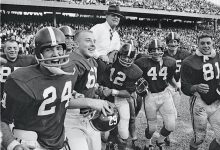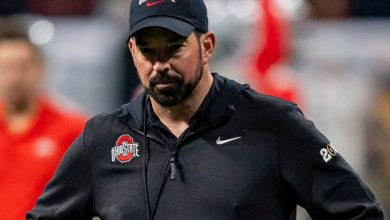Bought for \$100, now worth over \$6 billion, the Chicago Bears have proven to be one of the smartest and most valuable sports investments.

When the Chicago Bears franchise was originally purchased for a mere $100 in 1920, few could have imagined the monumental growth it would experience over the coming century. From humble beginnings in the early days of professional football to becoming one of the most iconic and valuable franchises in the NFL—and indeed all of sports—the Bears have evolved into a billion-dollar powerhouse. Today, with an estimated valuation exceeding $6 billion, the Chicago Bears stand as a testament to the lucrative and strategic potential of sports franchise ownership.
In this article, we dive into the historical journey of the Bears as a franchise, examine the factors contributing to their immense growth in value, and explore why the Bears remain one of the smartest investments in sports history.
The Humble Beginnings: From Decatur Staleys to Chicago Bears
The story begins in 1919 when the team was founded as the Decatur Staleys, owned by the A.E. Staley food starch company. In 1920, the franchise was bought by George Halas for a nominal sum—often cited as around $100—a modest price reflecting the nascent stage of professional football, which was then overshadowed by college football and far from the multi-billion-dollar industry it is today.
Halas, a player-coach-owner, moved the team to Chicago in 1921, renaming them the Bears. His vision, leadership, and relentless drive laid the foundation for a franchise that would dominate early NFL history. Under Halas’ stewardship, the Bears won multiple NFL championships, helping build a passionate fanbase rooted in Chicago’s blue-collar ethos.
The original $100 investment was more than just a financial transaction—it was a leap of faith in a sport and city destined for greatness.
The Rise of the NFL and the Bears’ Enduring Legacy
Over the decades, the NFL grew exponentially in popularity, fueled by television contracts, superstar players, and expanding fan engagement. The Bears, one of the league’s charter franchises, capitalized on this growth through success on the field, iconic players like Walter Payton and Dick Butkus, and a loyal Chicago fanbase.
The Bears’ reputation as a storied franchise with a winning tradition, highlighted by their 1985 Super Bowl victory, helped solidify their position as a key pillar of the NFL. This legacy has driven strong ticket sales, merchandise revenue, and local support, all contributing to the franchise’s increasing value.
Moreover, the Bears’ commitment to building a state-of-the-art stadium—Soldier Field—has played a pivotal role. Despite renovations and challenges, Soldier Field remains an iconic venue, deeply embedded in Chicago’s sports culture, and a vital asset for the franchise.
The Modern Era: NFL’s Explosive Financial Growth
The most significant driver behind the Bears’ staggering valuation is the NFL’s explosive growth as a global sports enterprise. Over the past 30 years, the league has transformed into a media and entertainment juggernaut.
Television broadcasting deals have been the biggest revenue engine. Lucrative contracts with networks such as ESPN, CBS, NBC, and Fox generate billions annually, distributed equitably among teams. This revenue-sharing model has ensured all franchises—including the Bears—benefit from the league’s collective financial strength.
Additionally, the rise of digital streaming platforms, sponsorship agreements, and international expansion efforts have further boosted league-wide income. The Bears, with their large market and passionate fanbase, are uniquely positioned to capitalize on these revenue streams.
Brand Power and Market Size: Why Chicago Matters
Chicago’s status as the third-largest U.S. media market adds immense value to the Bears franchise. The city’s deep-rooted sports culture and massive population provide a vast fanbase eager to support the team through ticket sales, merchandise purchases, and media consumption.
The Bears’ brand itself is iconic, synonymous with toughness, tradition, and a storied football past. This brand recognition extends globally, aided by international NFL games and media exposure. As the NFL seeks to expand worldwide, franchises like the Bears are poised to benefit from increased merchandise sales and international broadcasting rights.
The team’s loyal and often passionate fanbase ensures sustained demand, even during rebuilding years, adding stability to the franchise’s revenue outlook.
Strategic Investments: Ownership and Management
The current ownership group, led by the McCaskey family, descendants of George Halas, has played a crucial role in maintaining and growing the franchise’s value. While challenges exist—such as performance fluctuations and stadium issues—the ownership has invested strategically in infrastructure, marketing, and community engagement.
Negotiations around Soldier Field, including potential renovations or new stadium plans, are ongoing and have significant financial implications. A modern, fan-friendly stadium could further elevate revenue through enhanced ticket sales, premium seating, and lucrative naming rights deals.
Furthermore, savvy management of player personnel, coaching staff, and business operations contributes to competitive performance and financial health. The Bears’ ability to attract sponsors and corporate partnerships also underscores their business acumen.
Merchandise, Media, and Digital Engagement
Merchandising is a critical revenue stream for the Bears. The team’s distinctive logo, colors, and history drive strong jersey, apparel, and memorabilia sales. Official NFL merchandise is sold both domestically and internationally, with digital platforms expanding reach.
Social media engagement and digital content help maintain fan interest year-round, facilitating fan loyalty and engagement beyond the traditional football season. The Bears’ media presence on platforms like Twitter, Instagram, and TikTok allows the team to connect with younger audiences, expanding their brand footprint.
Challenges and Opportunities Ahead
While the Bears’ financial success is undeniable, the franchise faces challenges typical of any sports entity. On-field performance directly impacts fan enthusiasm and revenue potential. The Bears are under pressure to build a consistently competitive team that can contend for championships, which would boost ticket sales, merchandise, and sponsorships.
The stadium situation is also a major consideration. Soldier Field, while iconic, has limitations compared to newer venues. Decisions regarding upgrades or replacement will influence the franchise’s future valuation.
However, opportunities abound. The NFL’s continued global expansion offers new markets. Emerging technologies—like augmented reality fan experiences and enhanced broadcast innovations—promise to revolutionize fan engagement and revenue models.
Why the Bears Are One of the Smartest Investments in Sports
Considering the original $100 investment in 1920, the Chicago Bears’ current $6+ billion valuation is nothing short of extraordinary. The franchise has delivered massive returns to its owners while cultivating one of the most passionate fanbases in the world.
Several factors explain why the Bears represent a model sports investment:
- Historical Legacy: Deep roots and success attract loyal fans and media attention.
- Market Size: Chicago’s large population and media market amplify revenue potential.
- NFL Growth: Revenue sharing and broadcasting contracts provide financial stability.
- Brand Equity: Iconic branding fuels merchandise sales and sponsorship deals.
- Strategic Ownership: Ongoing investments and management maintain competitive relevance.
- Fan Loyalty: A passionate fanbase ensures consistent demand despite performance fluctuations.
This combination of heritage, business savvy, and market dynamics makes the Bears a unique and valuable asset within the sports world.
A Century of Growth and Promise
From a $100 purchase to a multi-billion-dollar valuation, the Chicago Bears’ journey exemplifies the incredible growth and profitability possible in professional sports. The franchise’s legacy, combined with the NFL’s rise as a global powerhouse, has created a nearly unparalleled investment success story.
Looking forward, the Bears face challenges that will test their ability to sustain and grow this value. But with strong leadership, a dedicated fanbase, and the powerful backing of the NFL ecosystem, the franchise is well-positioned to remain a financial and cultural icon.
The Chicago Bears are more than just a football team; they are a lasting testament to the potential of visionary ownership and the enduring power of sports to captivate and unite millions. As the franchise continues to evolve, the original $100 investment will forever stand as one of the smartest in sports history.
If you want, I can help create additional focused pieces on the Bears’ financial strategies, historical moments, or fan culture. Just say the word!









